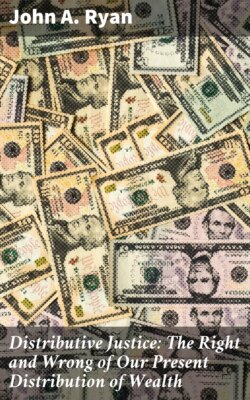Читать книгу Distributive Justice: The Right and Wrong of Our Present Distribution of Wealth - John A. Ryan - Страница 17
На сайте Литреса книга снята с продажи.
Arguments by Socialists
ОглавлениеTable of Contents
Indeed, the orthodox or Marxian Socialists are logically debarred by their social philosophy from passing a strictly moral judgment upon property in land. For their theory of economic determinism, or historical materialism, involves the belief that private landownership, like all other social institutions, is a necessary product of economic forces and processes. Hence it is neither morally good nor morally bad. Since neither its existence nor its continuance depends upon the human will, it is entirely devoid of moral quality. It is as unmoral as the succession of the seasons, or the movement of the tides. And it will disappear through the inevitable processes of economic evolution. As expressed by Engels: "The growing perception that existing social institutions are unreasonable and unjust, that reason has become unreason, and right wrong, is only proof that in the modes of production and exchange changes have taken place, with which the social order, adapted to earlier economic conditions, is no longer in keeping."[8]
Frequently, however, the individual Socialist forgets this materialistic theory, and falls back upon his common sense, and his innate conceptions of right and wrong, of free will and responsibility. Instead of regarding the existing land system as a mere product of blind economic forces, he often denounces it as morally wrong and unjust. His contentions may be reduced to two propositions: The proprietor who takes rent from a cultivator robs the producer of a part of his product; and no one has a right to take for his exclusive use that which is the natural heritage and means of support for all the people. Referring to the receipt of 35,000,000 pounds a year in rent by 8,000 British landlords, Hyndman and Morris exclaim: "Yet in the face of all this a certain school still contend that there is no class robbery."[9] Since the claim that the labourer has a right to the full product of his labour applies to capital as well as to land, it can be more conveniently considered when we come to treat of the income of the capitalist. With regard to the second contention, the following statement by Robert Blatchford may be taken as fairly representative of Socialist thought: "The earth belongs to the people.... So that he who possesses land possesses that to which he has no right, and he who invests his savings in land becomes the purchaser of stolen property."[10] Inasmuch as this argument is substantially the same as one of the fundamental contentions in the system of Henry George, it will be discussed in connection with the latter, in the pages immediately following.
